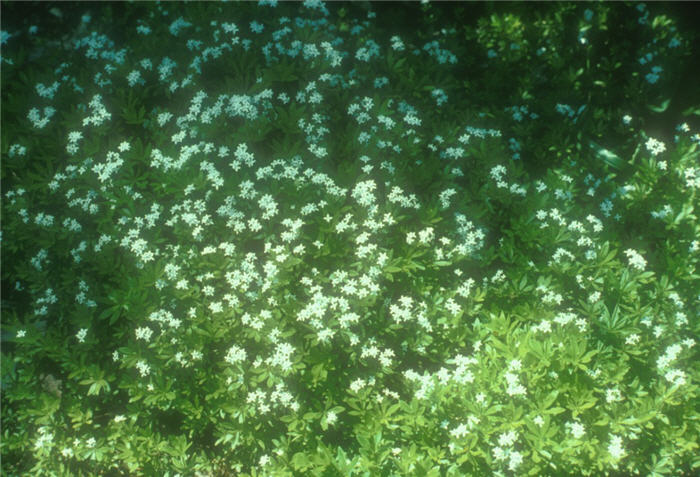| Botanical Name: Galium odoratum | |
| Common Name: Sweet Woodruff |

-
Anatomy
-
Culture
-
Design
Plant Type
Ground cover, Perennial, Herb
Height Range
Under 1'
Flower Color
White
Flower Season
Spring, Summer
Leaf Color
Green
Bark Color
n/a
Fruit Color
n/a
Fruit Season
n/a
Sun
Half, Shade
Water
Medium
Growth Rate
Moderate
Soil Type
Clay, Loam
Soil Condition
Average, Rich, Well-drained, Dry
Soil pH
Neutral, Basic
Adverse Factors
n/a
Design Styles
English Cottage, Formal, Japanese, Meadow, Mediterranean, Ranch, Spanish, Woodland
Accenting Features
Fragrance, Showy Flowers, Unusual Foliage
Seasonal Interest
Spring, Summer
Location Uses
Entry, Perennial Border, Shrub Border, Foundation, Parking Strip, Patio, Walkways
Special Uses
Filler, Mass Planting, Naturalizing, Small Spaces
Attracts Wildlife
n/a
Information by: Stephanie Duer
Photographer:
Photographer:
-
Description
-
Notes
Sweet Woodruff is a charming, delicate-looking groundcover well suited to dry shade areas; but its appearance is deceiving as this is one tough little plant). Growing to about 2 to 4 inches in height, with single plants eventually spreading 12 to 18 inches, it slowly carpets shady spots with bright green, whorled leaves. Flowers occur in spring, are white, four-petaled, and fragrant. Stems are slightly sticky. Plants emit a strong odor of freshly mown hay when foliage is crushed or cut. Aromatic intensity of the foliage increases when dried, thus dried leaves are popularly used in sachets or potpourris. Plants have also been used commercially in perfumes. Leaves are sometimes used to flavor teas and cold fruit drinks. Leaves are also used to make May wine, a punch made from white wine flavored with woodruff.
Grow in average, well-drained soils in part shade to full shade. Spreads by both creeping roots and self-seeding to form an attractive ground cover in shady areas. Can be somewhat aggressive in optimum growing conditions. Where restraint becomes necessary, plants can be mowed with a rotary mower on a high setting. Many references state that sweet woodruff requires a lot of moisture, but it seems to thrive in our heavy clay soils on moderate to dry watering schedules as long as it has shade. My dogs love to lay in this on hot summer days and it seems to take the use well.